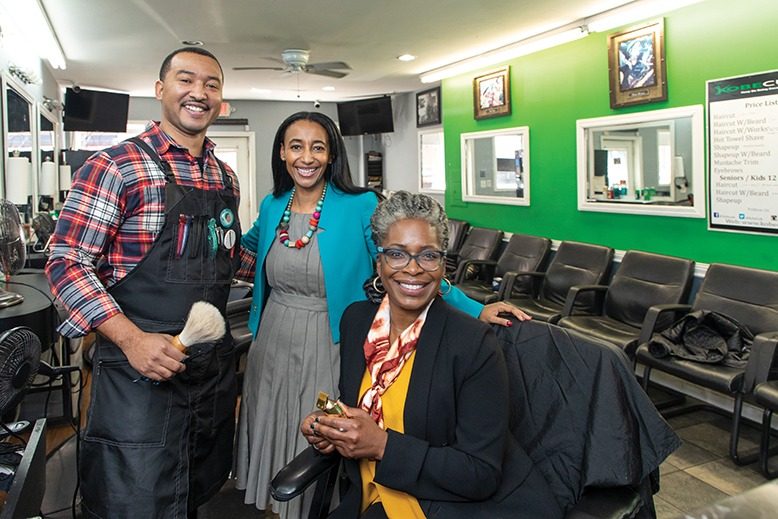
Alfa Demmellash can move mountains. At least that’s the way Gillian Sarjeant-Allen sees it.
“I’ve seen her make the impossible happen,” says Sarjeant-Allen, executive director of Rising Tide Capital, the Jersey City–based company Demmellash cofounded in 2004.
Demmellash, says Sarjeant-Allen, “has been determined and dogged about achieving the goals that she sees [as] beneficial for our internal staff and for the community of entrepreneurs, as well as the funders who make this happen for us.”
AS CEO of Rising Tide, Demmellash’s central goal is transforming lives and communities through entrepreneurship. To that end, Rising Tide helps aspiring entrepreneurs in underserved communities learn the skills they need to start and grow successful businesses. Rising Tide also identifies potential funding sources through its network of lending partners and provides coaching for clients as they pursue investors.
[RELATED: 10 Millennials to Watch]
Demmellash and cofounder Alex Forrester (now her husband) launched Rising Tide with a handful of clients. It has since grown into a nationally renowned institution serving more than 1,000 entrepreneurs each year—in English and Spanish—in six New Jersey cities. In 2018 alone, Rising Tide clients started 105 new businesses and created 426 new jobs, according to its latest annual report.
Rising Tide’s operations are supported mainly by corporate and foundation grants, as well as government grants, private donations and donated services. Combined, 2018 fundraising came to more than $4.84 million.
* * *
The story of Rising Tide is all the more remarkable considering Demmellash’s beginnings. Born in Ethiopia during that nation’s long and brutal civil war, Demmellash was raised by her grandmother and aunt after her mother emigrated to the United States. Demmellash was two when her mother left. In the States, her mother waited tables and started a fashion-design business, saving enough money to bring the 12-year-old Alfa to America in 1992.
Demmellash entered her teen years in Boston and went on to Harvard University, where she majored in government; she graduated cum laude. Her years at Harvard fed her curiosity about conflict resolution and about the ways in which governments could affect peoples’ lives.
“From the time that I could remember,” says Demmellash, “I was always shocked by just how much power government had and the role that it played in my family’s life.”
Eager to learn more, Demmellash and her classmates submitted a proposal for a research project in Rwanda, a nation that had been torn apart by a government-sanctioned campaign of genocide. The Hutu-led government and civilian gangs slaughtered more than 1 million Tutsi people in the span of 100 days in 1994. The country had since stabilized under a new regime.
To Demmellash, the field trip looked like “a great way to learn about, how do you come back from total collapse?” she says. Her professor, Robert H. Bates, saw things differently. He deemed the trip too risky. But Demmellash and her Harvard classmates camped outside Bates’s office until he conceded.
Next, Demmellash needed to come up with $6,000 to pay for an instructor to lead the team. She again turned to Bates. “He took me to a bank branch in Boston right there and took out $6,000 from his personal account and put it in my hands, and he said, ‘Go, and I’ll come visit you in six weeks.’”
It was an extraordinary act of personal philanthropy. “It changed my life,” Demmellash says.
In Rwanda, Demmellash saw first-hand the role of entrepreneurship in building trust, community and relationships in a ravaged land. “The thing that clicked into place, is people need new forms of identity in order to be able to get out of wherever they’re stuck,” she says. She had found her focus.
Returning to the States, Demmellash resolved to influence communities here. She and Forrester met with community organizations and nonprofits in cities like Newark, Camden and Trenton to gain an understanding of local issues. In Jersey City, they came across Harvey George, a formerly incarcerated man who had started a nonprofit, Friends of the Lifers, to help young people make better choices. Through George, they recognized the need of many in the community for support to launch their ideas.
On their third meeting with George, they recognized something else. “We asked him to come to meet us downtown and have lunch,” Demmellash recalls. “But he didn’t show up. We walk outside [the restaurant], and he’s sitting there, and he says, ‘This is a nice place. I didn’t know if they would let me in.’”
The incident revealed what Demmellash and Forrester call “the institutional failures” that leave disadvantaged individuals feeling excluded from the mainstream. How could someone who is not comfortable entering a restaurant be expected to handle a lending institution?
* * *
Demmellash and Forrester formalized Rising Tide as a nonprofit in 2004 with the financial support of Forrester’s father, Doug Forrester, a Republican businessman who unsuccessfully ran for governor in 2005 against Democrat Jon Corzine. The senior Forrester, now chairman and CEO of Red Bank–based Integrity Health, also helped create a board of trustees, comprising friends and donors; he continues to serve as founding chairman of the board.
In 2006, Rising Tide launched the Community Business Academy (CBA), a program that provides budding entrepreneurs with the tools to start their businesses. The 12-week program costs $375 (financial aid is available to those in need), and teaches fundamentals like budgeting, marketing, bookkeeping and financing. Through networking, says Demmellash, students often learn as much from their peers as they do from instructors.
As of 2018, more than 2,500 individuals had completed the CBA program. After graduation, they can get ongoing coaching through Business Acceleration Services, another Rising Tide program. They can also take advantage of Rising Tide’s Credit to Capital program, which helps connect Rising Tide clients with funding sources. [Note: At deadline, Rising Tide paused all in-person events and classes due to the coronavirus emergency. Coaching and support services were available by phone and email.]
On average, 80 percent of Rising Tide businesses survive beyond the five-year mark; the nationwide average for startups making it five years is 50 percent, according to the Rising Tide annual report.
CBA graduate Dominique Anderson founded her business, Amazing Strides, with Rising Tide’s help. Anderson’s business works with the state’s Division of Developmental Disabilities and caregivers to connect individuals who have intellectual and developmental disabilities to needed services, such as occupational therapy and home care.
Anderson credits Rising Tide with helping her build her professional network and better manage her finances. She remains close to the organization.
“I feel like every event that I’m at with Rising Tide, Alfa is there,” says Anderson. “One of the greatest things about Rising Tide is it really is a family, and Alfa has so much going on, but she makes herself known and available to the Rising Tide family.”
* * *
When Sarjeant-Allen, Rising Tide’s executive director, first encountered Demmellash and Forrester in 2009, she was an entrepreneur with a vision. She enrolled in the CBA, where she learned much of what she needed to start her business, the Jersey City Food Cooperative, a program that provides local residents with healthy food alternatives at an affordable price.
“It was very hands-on,” says Sarjeant-Allen. “Alex and Alfa would show up in the classrooms to encourage us on a regular basis. We were hand-held through the entire process to understand what the expectations of launching a business would be and what kind of support they would provide through the whole process. It was a nurturing experience.”
As executive director, Sarjeant-Allen will spearhead the organization’s new headquarters at 311 Martin Luther King Drive. Rising Tide acquired the building to house its offices; the facility also will include 10 affordable-housing units, coworking spaces and more. Sarjeant-Allen is counting on the lessons learned from Demmellash to make the project a success.
“I’m in line and willing to follow her wherever she goes,” Sarjeant-Allen says of her mentor.
Sarjeant-Allen is not Demmellash’s only admirer. In 2009, Demmellash was selected as a CNN Hero. The same year, President Barack Obama recognized Demmellash during a White House speech on social innovation. In 2012, Forbes magazine named Demmellash one of its Most Powerful Women Changing the World with Philanthropy. She has received honorary doctorates from St. Peter’s University and New Jersey City University.
Paul Silverman, principal of Silverman, a Jersey City real estate developer, says of Rising Tide: “For many years, I’ve witnessed the amazing leadership of Alfa Demmellash and Alex Forrester changing the lives of so many … Alfa and Alex are thoughtful, generous and smart, energizing their team to produce incredible results.”
Now 40 and the mother of two, Demmellash looks forward to expanding the work she and Forrester began in Jersey City. Through the Rising Tide Network initiative, they are helping entities across the nation adopt the Rising Tide model for other at-need communities. In Chicago, Sunshine Enterprises has launched its own CBA program. Initiatives in Charleston, South Carolina, and Charlotte, North Carolina, are also offering Rising Tide–inspired services.
Says Demellash: “We are modeling what it looks like to bring together that community of self-identified entrepreneurs who we’ve knit together, as well as build the kinds of enterprises that support social cohesion, mental wellness, culture creation.”
The transformative vision, she adds, has global implications. “You can’t do that work with just a local or regional perspective.”
